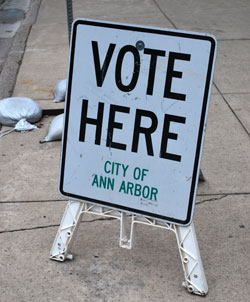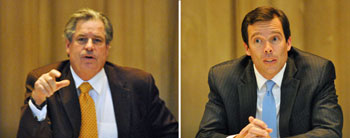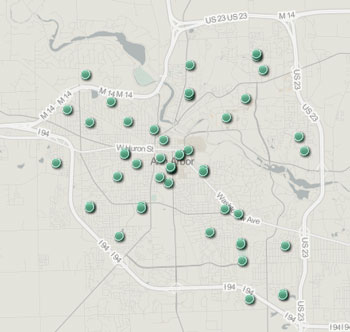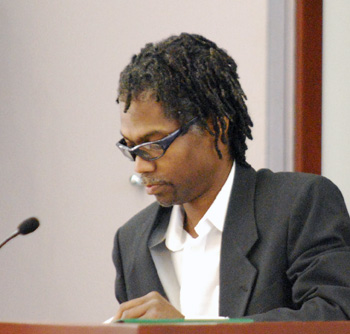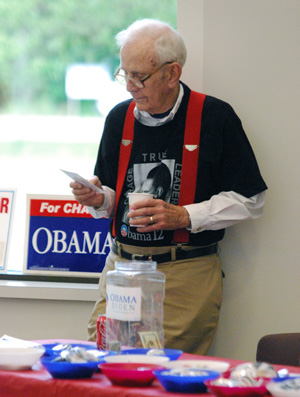Attorneys Carol Kuhnke and Jim Fink, the top two vote-getters in the Aug. 7, 2012 primary, are now vying for a vacancy on the 22nd Circuit Court bench to be left by retiring judge Melinda Morris. The nonpartisan judicial elections on Nov. 6 are for six-year terms.
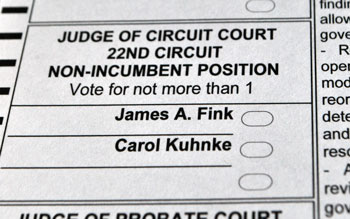
Names on the ballot for the non-incumbent position on the 22nd Circuit Court: Jim Fink and Carol Kuhnke. (Photos by the writer.)
At a candidate forum held in Ann Arbor’s Bach Elementary School cafeteria earlier this month, sponsored by the Washtenaw County Bar Association and the Old West Side Association, Kuhnke and Fink fielded questions on fairly standard topics: judicial temperament, experience, role models and the like.
In addition, Kuhnke and Fink have both provided written responses to questions on the League of Women Voters vote411.org website. And they previously participated in a June 23 forum for the primary race covered by The Chronicle, which included a total of four candidates.
Campaign finance statements filed with the state show that the cumulative total amounts raised by Kuhnke and Fink for their campaigns are $82,018 and $93,465 respectively.
Of her $82,018 total, Kuhnke has raised $46,738 since the primary election, and had spent just $13,892 between the primary and the close of books on Oct. 21. That left her with $34,405 to spend in the final two weeks of the general election campaign. Of his $93,465, Fink has raised $37,635 since the primary, and has spent $20,967 during the same period. He has $21,417 left to spend in the final two weeks.
Kuhnke has been practicing law for 18 years, longer than Fink’s 14 years, and is campaigning with the slogan, “The most experienced.” Fink is inclined to add to the mix his previous 20 years of experience working in law enforcement, starting in 1977 as a Washtenaw County sheriff’s deputy and moving up the ranks to commander.
Fink argued implicitly that the quality of the endorsements he’s received – from local judges – is better than some Kuhnke has received, from judges in other counties in southeastern Michigan where she’s argued cases. One local judge, Tim Connors – who is seeking re-election to the 22nd Circuit Court in a separate race against Mike Woodyard – is listed on websites for both Fink and Kuhnke among their endorsements. Connors and Woodyard participated in the Oct. 16 forum with Fink and Kuhnke – their responses are included in a separate Chronicle report.
Fink challenged any perception that he felt entitled to the judgeship based on the service of his father and older brother as judges, by stating it’s not the case that he felt entitled. He described how he’d always planned to practice law, even though he took a “side trip” to work in law enforcement.
Kuhnke described her vocation to the law as stemming in part from her undergrad studies in philosophy, and the impact that the meaning of words can have on people’s lives. She was matter of fact in drawing out one contrast between herself and Fink: “I’m a woman.” She thinks that having a woman’s voice on the court is important, but stated that she did not think she deserved a vote just because she is a woman.
An issue related to women’s health was highlighted in a question fielded from the audience. Fink is endorsed by Right to Life of Michigan – so the question related to whether Fink had pledged to rule against young women who were requesting a “judicial bypass” for permission to have an abortion. Fink was emphatic in stating that in order to receive that organization’s endorsement, he’d made no such pledge and that he hadn’t been asked such a question.
Even though the judicial bypass question came last at the forum, this detailed report of candidate responses begins there. [Full Story]




